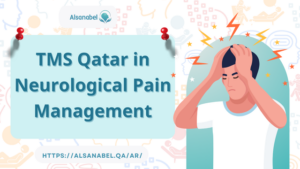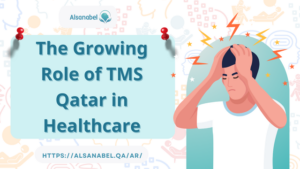How TMS Qatar Can Help Manage Chronic Pain Without Medication 2024
- Category Mental health hospital Qatar
Chronic pain is a pervasive issue that affects millions globally, often leading to a heavy reliance on medication. TMS Qatar is emerging as a significant tool in the fight against chronic pain, providing relief without the drawbacks of pharmaceutical treatments. This article will explore how TMS Qatar is revolutionizing the management of chronic pain, detailing its mechanisms, benefits, and the impact it has on patients’ lives, thereby offering a glimpse into a future where pain management is both effective and devoid of medication dependencies.
TMS Qatar in Neurological Pain Management
TMS Qatar has shown promise not only in psychiatric treatment but also in the realm of neurological pain management. Here’s an overview of its role and applications in mental health Qatar:

Mechanism of Action:
- Neurostimulation: TMS involves the use of magnetic pulses to stimulate specific areas of the brain. This stimulation can modulate neuronal activity, alter neurotransmitter levels, and influence neural pathways involved in pain perception.
Applications in Neurological Pain Management:
- Chronic Pain Conditions: TMS has been studied and applied in the management of chronic pain conditions, including:
- Migraines: TMS has shown effectiveness in reducing the frequency and severity of migraine attacks.
- Neuropathic Pain: Conditions such as diabetic neuropathy and neuropathic pain syndromes have been targeted with TMS to alleviate symptoms.
- Fibromyalgia: TMS has been explored as a treatment option for fibromyalgia, a condition characterized by widespread musculoskeletal pain and tenderness.
- Targeted Stimulation: Depending on the pain condition, TMS can be applied to different areas of the brain associated with pain processing, such as the prefrontal cortex, motor cortex, or other cortical regions.
Clinical Effectiveness:
- Reduction in Pain Intensity: Studies have demonstrated that TMS can lead to significant reductions in pain intensity and improvements in overall pain management.
- Non-Invasive Nature: Like in psychiatric applications, TMS for pain management is non-invasive and generally well-tolerated, with minimal side effects compared to more invasive procedures.
Considerations and Future Directions:
- Research and Innovation: Ongoing research continues to explore the optimal parameters for TMS in pain management, including frequency, intensity, and duration of sessions.
- Integration into Pain Treatment Protocols: TMS is increasingly being integrated into comprehensive pain management protocols alongside other therapies such as medication, physical therapy, and psychological interventions.
Transcranial Magnetic Stimulation (TMS) represents a promising adjunctive therapy in neurological pain management, offering a non-invasive alternative or complement to traditional treatments. As research progresses and clinical applications expand at mental health Qatar, TMS holds potential to improve pain relief and quality of life for patients with chronic and treatment-resistant pain conditions.
A Closer Look at TMS Therapy Sessions in Qatar
TMS therapy sessions are available primarily through specialized clinic and mental health hospital Qatar that offer advanced mental health services. Here’s a closer look at what you might expect from TMS therapy sessions in Qatar:
- Initial Consultation: The process typically begins with an initial consultation with a qualified healthcare provider. This could be a psychiatrist, neurologist, or a specialist trained in TMS therapy. During this consultation, your medical history, symptoms, and treatment goals will be discussed to determine if TMS is suitable for you.
- Treatment Planning: If TMS is deemed appropriate, a personalized treatment plan will be developed. This plan will outline the number of sessions required, the frequency of treatments, and the specific areas of the brain to be targeted based on your condition.
- TMS Sessions: Each TMS session involves sitting comfortably in a chair while a magnetic coil is placed against your scalp. The coil delivers repetitive magnetic pulses to stimulate nerve cells in targeted areas of the brain associated with your condition, such as depression or other mental health disorders.
- Duration and Frequency: TMS sessions typically last between 20 to 40 minutes, depending on the specific protocol prescribed by your healthcare provider. The frequency of sessions can vary but is often scheduled daily or several times a week over a period of several weeks.
- Monitoring and Adjustment: Throughout the course of treatment, your response to TMS therapy will be monitored closely. Adjustments to the treatment parameters may be made based on your progress and any feedback regarding your symptoms.
- Side Effects and Safety: TMS is generally well-tolerated, with minimal side effects such as mild scalp discomfort or headache. The procedure is non-invasive and does not require anesthesia, allowing you to resume normal activities immediately after each session.
- Integration with Other Therapies: TMS therapy may be used as a standalone treatment or in combination with other therapeutic approaches, such as medication management or psychotherapy, to optimize outcomes.
- Follow-Up and Maintenance: After completing the initial course of TMS therapy, follow-up appointments may be scheduled to assess long-term benefits and determine if additional sessions are needed for maintenance.
In Qatar, healthcare facilities like Hamad Medical Corporation (HMC), Sidra Medicine, and private clinics affiliated with specialized mental health services are likely to offer TMS therapy. It’s advisable to consult with a healthcare provider to discuss your specific needs and explore the availability of TMS therapy options in Qatar.
The Growing Role of TMS Qatar in Healthcare
Transcranial Magnetic Stimulation (TMS) is increasingly recognized and utilized in healthcare for its therapeutic potential across various conditions. Here’s how TMS is expanding its role at mental health Qatar:

- Treatment of Depression:
- TMS has FDA approval for treating major depressive disorder (MDD) in patients who have not responded to traditional antidepressant medications.
- It offers a non-invasive alternative to electroconvulsive therapy (ECT), particularly for patients seeking a more tolerable treatment option with fewer side effects.
- Anxiety Disorders:
- Research is exploring TMS as a potential treatment for anxiety disorders, including generalized anxiety disorder (GAD) and obsessive-compulsive disorder (OCD).
- Preliminary studies suggest that TMS may help modulate neural circuits involved in anxiety regulation, though more research is needed to establish efficacy and safety.
- Neurological Conditions:
- TMS is investigated for various neurological conditions such as migraine headaches, Parkinson’s disease, and neuropathic pain.
- It may offer symptom relief by targeting specific brain regions implicated in these conditions, though its application varies and requires further clinical validation.
- Substance Use Disorders:
- TMS is being studied for its potential in aiding substance use disorder treatment, including nicotine addiction and alcohol dependence.
- By targeting brain regions associated with cravings and reward processing, TMS may help reduce substance cravings and support abstinence efforts.
- Neuropsychiatric Rehabilitation:
- In rehabilitation settings, TMS is explored for improving cognitive function and motor skills in patients recovering from stroke or traumatic brain injury.
- It may facilitate neural plasticity and recovery by stimulating cortical areas involved in motor and cognitive functions.
- Personalized Medicine:
- TMS offers a personalized treatment approach by allowing customization of stimulation parameters based on individual patient responses and neurological profiles.
- Advances in neuroimaging and biomarker research may further enhance its precision and efficacy in targeted brain stimulation.
- Advancements in Technology and Research:
- Ongoing technological innovations, such as navigated TMS (nTMS) for precise targeting, and concurrent neuroimaging techniques, are advancing the application and understanding of TMS.
- Robust clinical trials continue to expand the evidence base supporting TMS across different therapeutic areas and patient populations.
Overall, the growing role of TMS in healthcare underscores its potential as a versatile therapeutic tool beyond depression treatment. As research progresses and clinical applications evolve, TMS holds promise for enhancing patient outcomes in neuropsychiatric care and rehabilitation settings.
In conclusion, TMS Qatar offers a promising alternative to medication for managing chronic pain. By utilizing Transcranial Magnetic Stimulation, this innovative approach targets the brain’s neural pathways, potentially altering pain perception and providing relief without the side effects associated with traditional pain medications. As chronic pain sufferers seek more sustainable and less invasive treatment options, TMS Qatar stands out as a significant advancement in pain management, offering new hope and improved quality of life for those affected.









